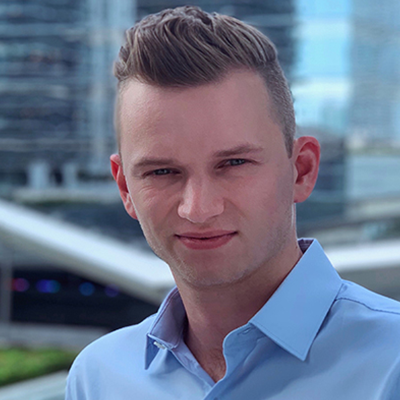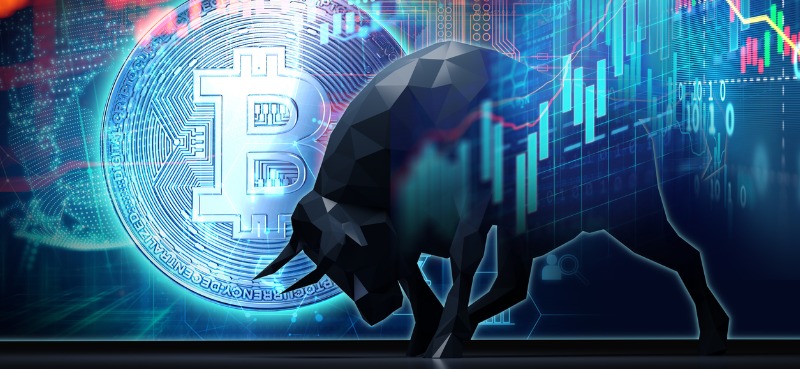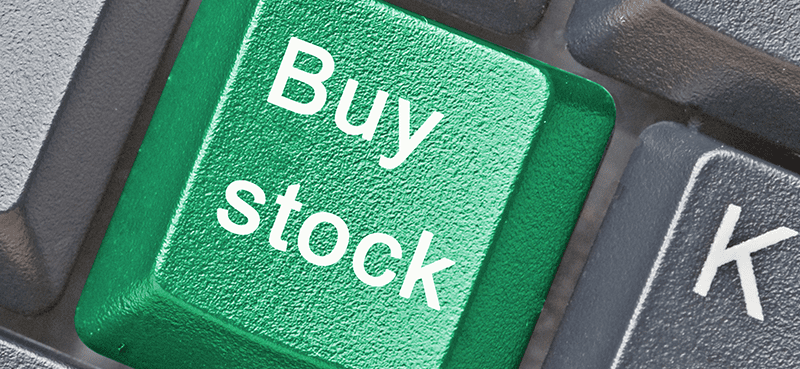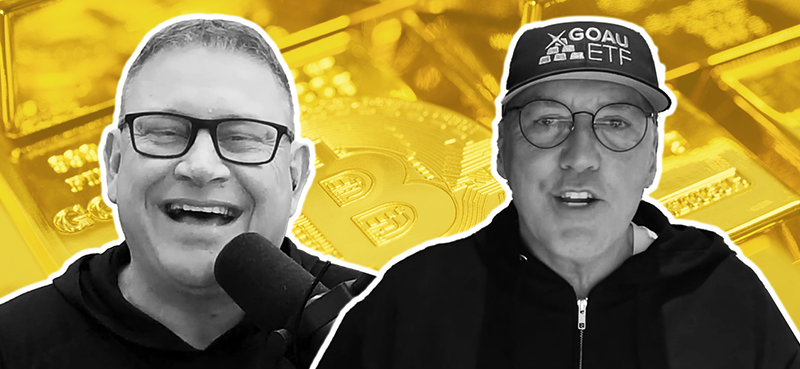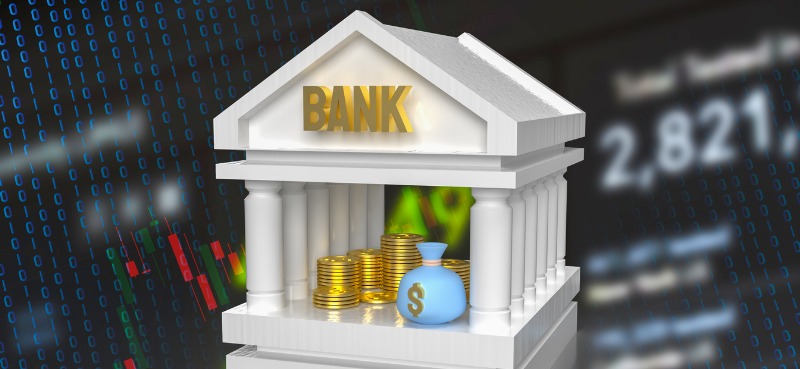The security token market has seen some astounding breakthroughs recently… sending the industry into a full-blown takeoff.
Kyle Sonlin, CEO and founding partner of Security Token Market, breaks down everything that’s taking place in the digital securities market… from regulation and liquidity to why its early-stage nature is good for investors. Kyle also shares his thoughts on cryptocurrencies, including bitcoin’s recent breakout. [28:54]
Most investors don’t understand how inflation really works. The truth is, it doesn’t matter if prices in the real world are moving higher… all that matters when it comes to inflation is the Federal Reserve. Here’s why you need to prepare for low rates for a very long time… and which sectors will reap the rewards. [1:01:41]
- Guest: Kyle Sonlin, CEO and founding partner of Security Token Market [28:54]
- Educational: These sectors will benefit the most from low rates [1:01:41]
Wall Street Unplugged | 734
The security token breakthrough we've been waiting for...
Announcer: Wall Street Unplugged looks beyond the regular headlines heard on mainstream financial media to bring you unscripted interviews and breaking commentary, direct from Wall Street, right to you on Main Street.
Frank Curzio: How’s it going out there? It’s August 12. I’m Frank Curzio, host of the Wall Street Unplugged podcast, where I break down the headlines and… tell you what’s really moving these markets.
Frank Curzio: So, CNBC published a story today on their site, with a title, “Wall Street executives are glad Joe Biden picked Kamala Harris to be his Vice President running mate.” That’s the title of it. I’m sure all of you know, on Tuesday, Biden finally announced his Vice President pick. He pretty much handcuffed himself, what was it, about six months ago, saying his choice of VP would be a woman. Particularly, four Black women are on his short list. Which, I kind of love that he said that. He just couldn’t say women are on his list, it’s definitely going to be a woman. He made the point to use the word Black.
Frank Curzio: Imagine if someone running for President said, “My Vice President pick is going to be an old male, and four white ones are on my short list.” Imagine if somebody said that. That person would be kicked out of the race before he even finished that sentence. But I love the “politicalness.” I know that’s probably not a word, but you know what I mean, of making sure that use the right words. Throw in Black in there, try and attract more voters, which I think is hilarious.
Frank Curzio: Anyway, Joe finally picked Kamala Harris on Tuesday, who was the odds-on favorite. His supporters cheered. Today, when I asked Biden, “Hey, what was the biggest factor in choosing Kamala Harris?” He said, “Wait a minute. I picked Kamala Harris to be my Vice President yesterday?” I’m joking. I’m joking. I know Republicans attack him. I know he makes a lot of gaps. I get it. It was a joke.
Frank Curzio: Getting back to the CNBC story here, how Wall Street executives love the Kamala Harris pick. I find that a little surprising. Harris is the U.S. Senator for California. We have a lot of large tech companies there. We have Apple, Google headquartered in California. Apple’s closing a two trillion dollar, two trillion dollar, trillion dollar, I can’t believe I’m saying that, market cap. Google’s making its way there. You have Netflix, Facebook also in California. Amazon, Microsoft, pretty close. They’re in Seattle. Those companies alone represent 23% of the entire S&P 500 based on market cap, have billions, billions, and billions of pocket change to support the candidate. I get it.
Frank Curzio: So, when you say tech executives, if that’s what the headline was, I would agree with it. Tech executives love the pick, okay, that’s fine. She’s pretty freaking left. There’s no question about that. Just go back to her record. Again, you’re going to think it’s political. It’s not. I’m going to tell you why I’m talking about this, and why it’s important for your investments.
Frank Curzio: When you look at her policies, no fracking, defund the police, massive global control measures; all things she said. No autonomous vehicles and she threatened to bring a lawsuit against Uber if they didn’t remove their driverless vehicles from California, if you remember that.
Frank Curzio: Free college, free healthcare for everyone, including people who are in the state illegally. Again, things that she’s said. Eliminate all private health insurance. That, by the way, killed her Presidential campaign. Her numbers crashed as soon as she said that. She was out of the race immediately.
Frank Curzio: She wants to raise teachers’ salaries, support AOC’s New Green Deal, which, I don’t know if you guys actually took a look at that, which is fun. It calls for the elimination of all carbon emissions. So, no cargo ships, cars running on gasoline, no airplanes. No airplanes. Sorry if you live in Hawaii and there’s a category 5 hurricane coming your way. Too bad. You can’t fly off the island, because there’s no more airplanes. Sorry. No more nuclear plants, which is one of the cheapest, safest, definitely misunderstood, but cleanest based energies in the world, supplies 20% of the electricity in the United States.
Frank Curzio: Looking at that deal, a quick question for AOC is, I know all the homework you put into all this, to really come up with this New Green Deal. But if there’s no fracking, no nuclear, you’re looking at energy here. How are we going to actually import our energy, import oil? You can’t fly it, because airplanes don’t exist. You can’t ship it, cargo ships. I guess we’ll worry about that later on. We’ll worry about that later. Not a big deal. That’s your Green Deal. But I would love for you to answer that question. It’s interesting.
Frank Curzio: But these are Kamala’s policies, which in turn, are mostly Joe Biden’s policies, or things he needs to support to get votes. So, I understand the pick. Harris is definitely the most qualified out of the choices that he left himself. She’s going to do good in debates. At least she’s great on stage. She’s not going to make many mistakes on the campaign trail, where she’s going to put her foot in the mouth. I don’t see that. She made that mistake when it came to private healthcare.
Frank Curzio: Plus, she caters to the wealthiest people on the planet, running these giant tech companies in California. So, the pick makes sense. What I don’t understand is the story I’m seeing out there. It’s not just CNBC. I’m not criticizing CNBC at all. But this is their story. They interviewed a whole bunch of people in that story. If you want to read it, I think it’s one of the top stories on CNBC today; how this is great, and all these executives from wherever, who support this pick and are Democrats, they love it.
Frank Curzio: But I don’t understand how anyone can say that Wall Street, Wall Street, not tech execs, but Wall Street likes this pick. I thought everybody hated Wall Street. I’m on Wall Street. I’m not on Wall Street anymore, but I understand, so I created this podcast, because there’s a lot of bullshit out there. You guys listen to me. I tell you the truth. I want to level that playing field for Mom and Pop investors, bring everything I’ve learned for 25 years to you. That’s why I’ve been doing this for 12 years. Viewership’s going up, thanks to you spreading the word.
Frank Curzio: Again, always open, always honest. That doesn’t make me favorable in a lot of places. TV stations, which I used to be on all the time, call me to go on their shows. I don’t give a shit about that. I don’t care. That’s not me. That’s not what our brand is about. I’m not going to say something just to get more popular someplace else, or to be on a show, and change what I believe.
Frank Curzio: No way!
Frank Curzio: Let’s face it, when it comes to Wall Street, most people out there, they don’t like it. It’s big money, donations, rich get richer, and that has always been a knock against Trump, because Wall Street has been doing good, and he has favorable corporate policies, lower taxes. But did that just switch or something? Did that just switch? Now Wall Street loves Kamala Harris? I don’t understand the back and forth. Because from looking at her policies, and Wall Street, businesses are going to see a corporate tax rate move incredibly higher.
Frank Curzio: Everyone agrees with this. Biden came out and said that personally. So, if you’re Wall Street, that’s what they’re saying, Wall Street loves this. That means your taxes are going to go higher on the corporate level. Higher taxes, if you’re looking at tax, when you cut this tax rate, that this money flows into the pocket of business owners. You could say, “Well, the stock price could go higher.” But you’re using that money, at least most businesses should, not all of them do. But for us, for my business, using that money to hire more people, to grow faster.
Frank Curzio: It’s the reason why I don’t support healthcare for all. Yes, it would be nice, but not to the point where, I work my ass off, 15 hours a day, to try to provide you guys the best research out there and make you guys money, and now my healthcare costs are up tremendously. Anyone that owns a business will tell you, there’s no more good benefits, unless you’re working for the state, the city. Benefits are horrible! You’ve got to pay co-pays all the time. The money coming out of businesses, especially now. So many businesses are doing worse with COVID, and are forced to shut down, are cutting a lot of these benefits.
Frank Curzio: As a business owner, these are things that I support. But if you’re looking at that, lower corporate taxes means more jobs. More jobs, I guess, hey. Wall Street doesn’t mind. They want to pay more. They don’t like the way things have gone, but that’s fine. No matter where you support, doesn’t matter. But also, no fracking.
Frank Curzio: Wall Street supports this? Because that’s the agenda here, no fracking. How could any oil company, hundreds of Republicans right on Wall Street, support this? Talk about millions of jobs. No more fracking. If fracking disappears, millions and millions of Americans are going to be out of jobs!
Frank Curzio: Nuclear, eliminate nuclear altogether. Altogether, eliminate nuclear. I don’t know where you’re going to come up with the energy, just eliminate the whole thing. Again, more jobs. Private health insurance companies. You want to get rid of private healthcare insurance altogether? Do Wall Street executives in this field support this? Do auto executives on Wall Street support Biden and Harris? Really? Elimination of cars, which, again is a far stretch, is not going to happen.
Frank Curzio: Not that Biden’s going to adopt the New Green Deal policy because Kamala likes it. Again, a Vice President is really a non-issue, to be honest with you. It’s a non-issue. It creates a lot of noise, just like Sarah Palin. You need to create noise to this effect, and I think they’re doing a good job of it, which is fine.
Frank Curzio: But you’re looking at some of the things, even in the auto industry. Yes, we see new, electric vehicles on the market. We’re finally seeing Teslas here and there. You see them on the road. Electric cars make up 2% of the entire U.S. fleet. 2% right now. So, we’re looking at around 350,000 luxury vehicles expected to be sold this year. Compared to 16 and a half million of the total vehicle sales in the U.S., it’s a very tiny percentage.
Frank Curzio: So, auto executives are going to support a Biden win? The Wall Street thing really took me by surprise. I would think Wall Street would be more in favor of Trump, lower taxes and things like that. Again, we’re talking about Wall Street. Again, I know most people hate Wall Street, and that’s fine. You should, because there’s a lot of bullshit that goes on, that I saw firsthand, which is the reason why I don’t work on Wall Street anymore. I want to bring this to Main Street, where everybody can make money together.
Frank Curzio: But going through this, it’s not a political agenda. My job is to make you money. So, I have to pay attention to politics, because their policy is going to have a massive impact on many sectors, which is going to determine whether you’re going to make money or not.
Frank Curzio: Your portfolio, your allocation. So, how is it invested… Do you position yourself? Because you can’t tell me a Trump win is great for Wall Street, and now a Biden win, now that he has Kamala Harris on the ticket, is also good for Wall Street. Which, by the way, is the biggest red flag for any company. As a person who listens to tons of conference calls; thousands, if not tens of thousands over the last two decades listening to these calls. It’s the biggest red flag when a company says something like this. “If X happens, it’s going to be great for us, but if it doesn’t, or Y happens, that’s also going to be great for us.” No. Just sell the stock.
Frank Curzio: You can’t tell me something that’s going to be significant is going to be great for you no matter what. No. There’s got to be something that’s good for you, and something that’s bad for you. Maybe it benefits you a little bit, and the decision, if it happens, it benefits you a ton. But it’s never like, “Oh, they’re both going to be great for us.” No. If a company says that, good luck. Just get out of the stock. It means the CEO’s talking shit.
Frank Curzio: But right now, saying that, “Trump wins, that’s great for Wall Street,” because we saw favorable corporate policies, which has benefited Wall Street, and the rich get richer. We’re not getting political here. Now you tell me Wall Street also is happy about the Kamala pick, and supporting it now, and supporting Biden, which, again, looking at this whole entire thing and putting it in perspective, is kind of crazy.
Frank Curzio: Now, when we look at the election, it is going to have a significant impact on your portfolio, especially, especially if the Democrats get a clean sweep of the House to Senate, and a Biden win, which is projected in the polls right now, which we know are all meaningless, if we look back at the last election.
Frank Curzio: Because if you look at Democrats, they talk about this a lot; Schumer, Pelosi, across the board. Obama mentioned it, about eliminating the filibuster. So, they only need 60 votes in the Senate, or bipartisan support to pass their agenda. That’s put in place, so you don’t have times like this, where if it’s a clean sweep, you only need 50 in the Senate. You have more than 50 votes in the Senate, and that’s all you need to pass your agenda.
Frank Curzio: Meaning, that party, say if the Democrats win, they’re going to be able to pass any measure they want. No more guns? Hey, fuck you. No more fracking? Fuck you. No more planes? Fuck you.
Frank Curzio: They could pass anything they want, on both sides. You could say the same thing if Republicans had a clean sweep and eliminated the filibuster. You need those other votes to put things in perspective, say, “Wait a minute, guys. Don’t be stupid. You can’t have everything you want. Yes, you’re going to get some things. You deserve it. You won.”
Frank Curzio: When I’m saying it’s going to have a significant impact on your portfolio, I’m not saying if the Democrats win your portfolio’s going to get slaughtered. It’s about positioning yourself in the right sectors. Just say if Biden wins, renewable energy is going to soar. Cannabis, heavily supported by Democrats, most conservatives still on the fence.
Frank Curzio: Most healthcare and biotech stock, especially biotech, RIETS, consumer staples. I would buy China-based stock, because I think a lot of what Trump did will get rolled back. European auto makers, since they’re probably going to see lower tariffs. Trump, just raising tariffs, no “BS” whether you agree with it or not. I’m just talking about Biden, probably going to reverse a little bit. It’s probably going to be good for European auto makers.
Frank Curzio: Insurance and small to mid-size banking, as laws will be passed; more regulation to help these guys. I kind of think, not kind of. It’s a good thing. If you look at the banking sector, it’s the only sector where there’s no way, if you’re small, mid cap, that you could become a major. Facebook, look what Facebook did. Whether you like them or not, they became a powerhouse. Started from the ground up, became a powerhouse. You look at other industries, you could do that in other industries. In finance, it’s based on a laws is how much capital you have to keep. It’s impossible. They picked the majors. Here they are. Too bad. That’s what they’re going to be, for a very, very long time.
Frank Curzio: Again, those laws are put in place. It’s crazy. It’s like trying to start your own fund right now. If you try to start a fund, the cost to start your fund, you need minimum, minimum, $150 million under management, unless you’re charging 25% fees on profits or hedge fund. But if you’re looking at the normal rate, which is below 1% these days, but even at 1.5%, it’s millions and millions of dollars in regulation. It’s almost impossible, so the big get bigger and bigger.
Frank Curzio: It’s the reason why the Black Rocks and the Calpers, or you’re looking at all these places. It’s no more, hey, $100 billion. It’s trillions they’re managing. Trillions, and trillions, and trillions; Vanguard, trillions. It gets bigger, and bigger, and bigger. You don’t have choices.
Frank Curzio: But if Trump wins, kin of the status quo, what’s going on right now. Again, probably good for business, but I’m being told by reading a story in CNBC that no matter who wins, it’s going to be good for Wall Street. Wall Street loves this pick. Trump wins, kind of the status quo. Now, why am I talking about all this?
Frank Curzio: Because, of course, you have emotions. Everybody has those emotions when it comes to who you like, who you listen to, what station you listen to. Again, I don’t give a shit about that. But it’s important to understand, because the best way to position your portfolio right now, with the election just a few months away is to buy the sectors and stocks that are going to benefit no matter who wins.
Frank Curzio: Because remember something; our politicians don’t give a shit about you. They don’t give a shit about me. They don’t care about Black Lives Matter. They don’t care about green energy. They care about votes. They care about power, to the point where Kamala Harris said that she believes those women that said that they were sexually assaulted by Biden. She said, “I believe they’re telling the truth,” and basically called him a racist during the debate. Yet, she’s running side by side with Biden now. If you truly believe those things, your character, if you believe those things, would you associate yourself with that person? Absolutely not.
Frank Curzio: But it’s politics. It’s power. It’s votes. It’s on both sides. You see it on both sides, guys. But care about yourself, care about your families, because the media, especially over the next few months into this election, they’re going to go crazy. You’re going to hear so many crazy stories about what these guys did when they were 18 years old. They’re going to bring up so much dirt, so much crap, try to destroy… I have no idea why Kamala Harris would even want to be the Vice President right now.
Frank Curzio: If you look at how every single person, you can go back to the Obama era, that he chooses for his cabinet, who gets grilled in Congress. Look at Trump, they just destroyed Brett Kavanaugh, what they did to that poor guy, Jesus! Destroyed, they tried to destroy that poor guy.
Frank Curzio: So, you know she’s going to get it, right. I don’t know what. But that’s okay. You know why? Because power’s more important than anything. Which means nothing to you. What you care about is your portfolio making money and generational wealth. That’s what you need to care about.
Frank Curzio: If you want to get ahead of this, buy the sectors and stocks that are going to benefit from either outcome, whoever gets elected. Which are dividend paying growth stocks with interest rates super low. I think cannabis is going to benefit no matter what, as well as online gambling, because these states, they’re all broke. They’re all broke. They’re going to have to pass to legalize this across the board. They’ve got to find ways to get revenue.
Frank Curzio: Housing, home builders, home retailers are going to continue to soar. Again, low interest rates, mortgage rates, record lows. Most healthcare stock, especially biotech, both support this industry. You need to own gold. Continue to own gold. You say, “Frank, why those sectors?” Well, because no matter who wins, who wins, just said it. Every state’s broke. Our economy’s not going to get back to 100% until at least 2022. Remember when they thought it was going to be six months? Pandemic, six months, we’ll get back to normal. We’ll see a quick V shape. Saw a V shape in stocks; the economy, not even close.
Frank Curzio: But probably longer than 2022. When do you see people sitting on the middle seat feeling comfortable, even with a vaccine out there. I’m not talking about the Russia vaccine. I’m talking about a real vaccine, that’s out there, that people trust. A lot of people aren’t going to take that, but still, when do you see that. When do you see that? Going to the middle seat in a plane. That’s 100% capacity. That means everybody’s okay, going to hotels. They don’t mind about anything anymore, not wearing masks anymore. Do you see that happening? This could be a fundamental change for a very, very long time. Which could impact a lot of different companies here and there.
Frank Curzio: But when you’re looking at our situation, the scenario right now is not going to change, no matter who gets elected. The gaps between rich and poor people are going to continue to widen. We’re going to have low interest rates, which are going to make assets continue to inflate. The Feds are going to have to continue printing money because of this gap. It’s still going to be… I know we’re bragging that the jobless number, “Hey, things are getting better.” Of course they’re getting better. Look where they were. We’re still at a 10% unemployment rate, which is unheard of. That’s worse than the credit crisis, but that’s good now. That’s great.
Frank Curzio: Markets, stock are at an all-time high. Nobody cares. But when the Fed is forced to keep rates low, and adopt certain policies, which I talked about, yield curve control, and things like that. It’s the reason why I think small caps are going to really take off. Cyclical names, I’ll get into that later on; educational segment.
Frank Curzio: But if you look at where the Fed has to sit, they have to keep interest rates low. They have to continue to inflate this market. You’re going to see that gap between rich and poor widen, no matter who gets elected. That’s going to impact a lot of sectors, especially the ones I had mentioned. One particular sector that I didn’t mention yet, which is going to be a huge beneficiary, maybe the biggest, over the next few years, again, no matter who gets elected, is cryptos. Specifically the larger ones like Bitcoin and Ethereum. They’ve caught a bit over the past two months. You’ve got to see the news on Bitcoin lately. Companies are actually investing in this now. This is a big deal. It’s here. It’s not something that’s fake, or going to zip. No. Absolutely not.
Frank Curzio: Not only have these bigger names caught a bid, but so have security tokens, something I talked about for a while. So, security tokens, they’re not utility tokens, or what you see with normal cryptos, where the utilities, which is the ones that you see everyplace, other than, I think Bitcoin’s not considered a security, or outside of that. But when you’re looking at a lot of this other bullshit; again, I’ve analyzed so many of these companies for my newsletter, Crypto Intelligence, where 87%, I’m talking about probably 1,000 of these I looked at, are really worthless. Their token is absolutely worthless.
Frank Curzio: Because they don’t provide an equity stake for you. What these utility tokens do, their value is derived from the services you could use from that token. So, you buy a token, and, “Hey, I can use it for this, and I can use it for this part, and get access to this on a website, or trading,” that’s cool. When you have Binance token, you can use it, get discounts. Most of these guys don’t even have working websites. They have nothing. The token is completely useless. If somebody believes their technology’s great, and comes in and takes them over for $50 billion, you get nothing. Zero, because you don’t have an equity stake. People still don’t understand that, when it comes to utility tokens.
Frank Curzio: Security tokens are totally different. They’re like stocks. They offer you equity stake in a business, and some pay a dividend. I believe in this industry so much, I launched Curzio Equity Owners token, CEO token, last year to credit investors. The lock up period is approaching, and we’re going to be the first security token in the world to trade on a global exchange. We have about 30 countries that’s available for retail investors to trade. That’s Mom and Pop investors.
Frank Curzio: We’re going to be the first to do that. A lot of work that we’re doing behind the scenes to make that happen. It’s looking like a September launch, to go free trading. I’ll send you those details once it happens. But more to the point is, the CO token, our token, the security tokens out there, what ours does is, we give you direct equity stake in our business, in Curzio Research.
Frank Curzio: Which, you can’t get anywhere in the financial newsletter publishing industry. They don’t give equity stakes for anything. No way. You could generate $300 million in revenue and be responsible for building up these divisions, and no matter what, they’re like, “Eff you. Nope, you don’t get an extra stake, sorry. Maybe shadow equity.” Learn that term. It’s pretty funny.
Frank Curzio: Just the name of it is funny, shadow equity. If you own shadow equity, guys, you should see a lawyer. Seriously, you should see a lawyer. Make sure you get something in writing. That’s all I’m saying.
Frank Curzio: But for our token, and we’re also paying a 3% dividend. So, what our security token, it’s tokenization, the selling off of the price of an asset, usually in a liquid one, like real estate, or commercial real estate that Mom and Pop investors could never own. It could be debt. It could be collectibles. In our case, a small grow company that’s now open for the public to buy.
Frank Curzio: The costs to do this were 1/10 if we decided to go on an exchange. It’s better for investors, because the lock up period is quicker where, if you invest in a private company, the average payback period, that liquidity event happens in seven to 10 years, where I’m either going to have to get bought out or an IPO. What do you do? You’re stuck with that. You’re just sitting there. This is one year later, you’re able to trade it. It makes sense. But the most important thing is, what do you see with IPOs these days? They all come out at crazy valuations. Uber, Facebook, all of them. Wouldn’t it be nice if you could be Peter Thiel, investing in these things at the very early stages of growth, and not when most of the growth has already taken place, when these things come out, billion dollar valuations.
Frank Curzio: Yes, it’s risky. Some companies are going to fail. Most small companies fail, yes. But given this opportunity, the due diligence process, to see these companies growing, and to get them on certain exchanges, the opportunity for you to buy these and generate income in a world, like our 3% yield is pretty freaking good right now, compared to almost every single company out there, even the ones that do provide yield.
Frank Curzio: But this is the opportunity where you’re seeing security tokens, and it took a while for this industry to get going. We’re super early to this party, started to gain steam. Then we had COVID, which slowed everything down. But right now, guys. Right now, pay attention to this. The sector is absolutely soaring, seeing the overall record cap continue to hit record highs. It’s opened up a huge market for Mom and Pop investors to truly buy companies like ours, during these super early growth phases.
Frank Curzio: Maybe we fail. Maybe you lose your money, but at least you have the opportunity. Because if it works out, we turn into a multi-billion dollar corporation, you’re going to be filthy rich, because you have a chance to buy this token, where you don’t have that chance anymore. These companies IPO at such higher valuations, where you’re buying them, and the valuations are so inflated that they come out at $500 million and they’re trading as if they’re going to be $5 billion valuations in 18 months from now. That’s a big leap of faith.
Frank Curzio: So, an industry, I want you to pay attention. It took a while, a lot of fun right now. That leads us to today’s guest, who is Kyle Sonlin. Definitely want to listen to him. Kyle’s a founding partner of Security Token Group, a company that provides consulting service to anyone looking to launch a security token, take you through the entire process of launching, the rules behind it, the regulation, raising money, providing marketing services.
Frank Curzio: Kyle’s one of the smartest people I know in this industry, as well as his partner, Herwig Konings. I have met them personally. I drove down to Palm Beach and we hung out, and just amazing how brilliant these guys are. But Kyle’s going to come on. He’s going to break down this industry. He’s going to have a total market cap. Like I mentioned, security tokens continues to hit new records every passing week.
Frank Curzio: The key events that have taken place over the last few months that allow this industry to finally start thriving. Two of the biggest concerns are now taken care of, for the foundation is built, and you’re seeing lots and lots of these security tokens coming back out. They’re starting to hit the markets now, which is a lot of fun.
Frank Curzio: But he’s also going to break down the industry as a whole, and tell you where he thinks it’s going to be in 12 months, three years, five years from now. Really great interview, I’m telling you. Please pay attention, because this is something I study to death. I brought this idea to all of the smartest people I know in finance, and told them to just, “Here. Here’s my idea. Destroy it to me.” All of them had tons of questions of me and I answered every one of them. They said, “Holy shit, Frank! This is fucking good idea.” I said, “I know.”
Frank Curzio: Now it’s finally coming to fruition, again. It’s something that’s disrupting a market that hasn’t been disrupted in a very long time, which is investment banking. Now you’re seeing this foundation built. Liquidity is there. Lots of fun. Kyle’s going to break that whole entire sector down, lots of good stuff to talk about.
Frank Curzio: Later on, in my educational segment, I’m going to talk about why most investors do not have a clue about inflation. I know people are going to get pissed when I say that, but the way you think about inflation dictates how you position your portfolio. A lot of you have been making wrong choices when it comes to asset allocation, based on how you see inflation. I’m going to teach you how to change that, which will help your portfolio generate much, much better returns.
Frank Curzio: A really great segment coming up, but first, let’s get to my interview with Kyle Sonlin.
Frank Curzio: Kyle Sonlin, thank you so much for joining us again, on Wall Street Unplugged.
Kyle Sonlin: Frank, it’s so great to be back. Thank you so much for having me.
Frank Curzio: Well, what a difference compared to last time you were on Wall Street Unplugged, because you’re one of the most connected people in the security token industry. That’s what drew me to you. I wanted to get you and your partner, Herwig Konings, personally. So, I drove down to Palm Beach. We had a couple drinks. We had a really good time. We were so positive on this market.
Frank Curzio: This is a little while ago. I would say maybe two years ago, close to that. But then 12 months passed, and I think we didn’t really see the adoption taking place, at least at the pace I thought, since security tokens, just to bring everyone in here. An amazing way small companies raise cash. We’re doing it ourselves, with our CEO token. You can have a publicly traded security at 1/10 the cost for investors, and they can trade that token 12 months later.
Frank Curzio: It was slow to adopt, then we had COVID. But now, this industry’s really starting to take off, both in the U.S. and globally. What’s changed? What are you seeing on your end, for someone that’s very connected in this industry?
Kyle Sonlin: What’s really changed is, I personally feel that the financial adoption of new vehicles and all this innovation does take a little bit of time. Really, what we were looking for in the security token industry was that flagship client, that hallmark opportunity that could really thrust the industry forward, and prove to the world that this was a viable option to raise capital, as well as proving all of the infrastructure that we’ve been developing over the past three to four years.
Kyle Sonlin: So, with security tokens, you’re upgrading a lot of the settlement, and clearing processes that a traditional security, or stock, would have. So, you need to stress test that a little bit. We haven’t quite had the opportunity to actually test that out in a live market, with real high demand.
Kyle Sonlin: What we saw just recently is Overstock. Overstock, which owns tZERO, the exchange. They’re a publicly traded company on NASDAQ. They actually issued a security token dividend to all of their public shareholders. This was back in May. May 19 was the dividend date. So, they paid out a security token of Overstock’s shares; the same exact classification as the public shares, except these were on the security token block chain. So, they were traded on tZERO, as opposed to being traded on NASDAQ.
Kyle Sonlin: So, this was the first time we’ve ever seen something like this happen, which is a fantastic opportunity. But what’s really brought it forward is the institutional interest in this token. We’ve seen a crazy increase in trading volume, a crazy increase in a lot of the market cap and the prices of these assets since that opportunity. So, that’s, I really think, the big tide that’s turned so far, Frank, that we’ve seen over the first half of 2020.
Frank Curzio: Yeah. There was a time, even during COVID, we saw all these stocks come down. We saw Overstock, I think the price of that stock fell below three. It’s trading close to 100. It was funny, because they were looking to sell Overstock to fund tZERO, because of the growth that they saw in that business, and they couldn’t. No one really wanted to buy it pre-COVID. Now, it’s drawn the company to the point where it’s also filtering down to the tZERO platform.
Frank Curzio: But you’re seeing, what is it, two tokens at trade on their exchange. But talk about the logistics behind this because now, just recently, I think maybe a month ago, they opened these tokens up. I don’t know if it’s both of them to tZERO or Overstock. There’s two tokens on the exchange right now.
Frank Curzio: But have, they opened up to retail traders, right? So, anyone could go there, open an account, and trade these things now, right? That’s a game changer.
Kyle Sonlin: Yeah, totally. The retail investor access is definitely something that would be considered the Holy Grail of security tokens. Because the technology itself isn’t doing anything that crazy or out of the box, aside from upgrading a lot of the processes we have. But the problem always was that, with a security token, in our traditional methods, only accredited investors would be able to invest in that.
Kyle Sonlin: But tZERO has really led the way, in terms of defining the operations that allow them to trade that as a retail offering. With Overstock, their security token, it was much easier, because it was the same exact share classification as their public offering. So, as long as they’re a publicly filed company, this is representation of the equity of that company, they were able to offer that to retail as well, since they were already publicly reporting for that company.
Kyle Sonlin: tZERO is also an interesting case for their token, because they leveraged what’s called Rule 144, which is an exemption that also allows them to trade retail investors. I think that’s going to be what you’re going to see many of these private companies leveraging, in order to be able to get retail investor access.
Kyle Sonlin: So, tZERO again pioneered the way, in terms of making that mainstream and allowing another option for issuers to be able to get that retail investor access, without having to file as a public company or do an IPO.
Frank Curzio: That’s really interesting. That’s great stuff, to see tZERO really take the lead here.
Frank Curzio: My next question was, just talk about regulation in the industry. Do you see it easing further, where the SEC has to act a little bit quicker, when it comes to providing licenses, or trading, or tariff trading systems? Because you’re seeing this industry, people are looking at tZERO, going, “Wow, look at the vibe. Look at the liquidity.”
Frank Curzio: That’s with every retail, or every institutional investor that I spoke to about this, before I launched our CEO token, Curzio Equity Owners token. They all asked me about liquidity. I said, “I’m going to do everything I can to provide liquidity, because when liquidity comes to the market like we’re seeing with the stock market, look what happens.” Valuations take off. You could filter in literally hundreds of billions of dollars into Microsoft and Apple today, and you wouldn’t even know it because their market caps are 1.7 trillion plus whatever.
Frank Curzio: But now you’re seeing this, and it’s also been blooming, which we’ve seen in many areas of the world. Do you see the regulation, friend, because I know you’re tied to that? You speak to a lot of lawyers within this industry, where they’re going to start saying, “Let’s start focusing on this. Let’s push it through because it is good for the investor. It’s saved cost for companies.”
Frank Curzio: To me, when I looked at this and created our token, it just made sense on every, single level. But yet, I just feel like the SEC still drags its feet with some companies.
Kyle Sonlin: Absolutely. I think that the regulation is definitely easing. The regulation moves slowly. Unfortunately, we just have to accept the fact that regulation can take years for things to change, and that’s intentional. We look at most of the regulations we use to trade stocks, and any kind of security, were determined in the 1930s during the Securities Act.
Kyle Sonlin: So, most of the framework that we use today is still based off of the laws and rules that were written 70, 80, 90 years ago. So, we just have to use that frame of reference when looking at security tokens and see the fact that, at least in 2020, as you correctly pointed out, we’ve seen a significant, I think lesser, scrutiny from the SEC and regulators on, not only these offerings, but the infrastructure itself.
Kyle Sonlin: When you’re looking at the offerings, they have clearly defined the fundraising exemptions. So, they are looking to expand those a little bit. They’ve taken comments from my firm, as well as from many others in the industry, in terms of how they can change those, or make those more accepting for issuers in the U.S. Then they’ve also actually approved security token offerings before they approved the Arca Funds tokenized offering. So, Arca is actually, they raised a fund that buys U.S. Treasuries, and then allows people to then buy those U.S. Treasuries as a tokenized offering.
Kyle Sonlin: So, they’ve approved security token offerings before, as well as, they have approved more ATS’s, and broker dealers in the digital space than we’ve seen in years past. So you’ve got companies like North Capital, as well as Rialto Markets that were both given ATS licenses, which allows them to do that trading for security tokens.
Kyle Sonlin: So, both were given that license. Both do have an interest and a focus on digital security tokens. So, they use some of that terminology. They’ve made it more understanding of, that’s the direction they’re heading. Then from broker dealers, we see the same thing, with Watchdog Capital, and many others that have just been approved, that all focus on the digital world and transforming our traditional securities markets.
Kyle Sonlin: It seems like the SEC is disinterested in working with those firms, to help the U.S. stay at the cutting edge of the financial markets, to stay innovating. But I think that their main focus is making sure that they can be in a regulated environment, that they know how to enforce it, and that it can scale properly without exposing investors to fraud.
Frank Curzio: Now, we’re seeing a move here in Bitcoin, Ethereum, many cryptos surging right now. Do you think this is also going to fuel the security token market?
Frank Curzio: Remember guys, security tokens are not utility tokens. Utility tokens, they don’t offer you an equity stake. Their value is derived from, basically the services that you can use from the token, which I’ve researched. About 80% of the industry, they have no services or use for the token.
Frank Curzio: With security tokens like ours, even the CO token, you get equity stake in our business, a fast growing publishing media company, early stages. We’re also paying a quarterly dividend, but it’s backed by assets.
Frank Curzio: Two totally different things, but to me, I feel like I’m getting a lot more calls now that we’re seeing Bitcoin push to 12,000, Ethereum go higher. A lot has to do with the Fed spending. I don’t want to get too technical here.
Frank Curzio: But do you think that’s also fueling this market, or is it just totally different?
Kyle Sonlin: Absolutely. I think that there’s a lot of ways to look at it. The first one is that as Bitcoin, and Ethereum, and some of these cryptos rise, you get a lot of these investors, that are invested in cryptos that are naturally a little bit more risk tolerant that what you’d see from the traditional markets. So, as these investors make money and have returns, they’re going to be looking for new opportunities to realize these same returns.
Kyle Sonlin: When you look at even a company like Overstock, the Overstock digital dividend was trading at $7.50 just 10 weeks ago. In that 10 week span, it’s up 11 times. It’s up to over $75 a share. So, the returns on these things are just as effective as these cryptos, except you actually have legal ownership.
Kyle Sonlin: We see the stock market going crazy. We see a lot of these things. I think that, on top of all of that, it’s also confirmed by a lot of the high profile security token offerings that have completed their fundraise. The Republic Note is a great example. Republic is a crowdfunding platform that helps companies raise capital, and they take a little piece of equity from each business that raises money on their platform.
Kyle Sonlin: So, Republic just launched their Republic Note, which is a security token offering, representing all 200 plus companies that they have equity in. As those companies get liquidity, that cash flow is then disseminated back to investors. They raised a full $11 million, which was $3 million over subscribed. They were aiming for eight. They raised 11 based off of so much interest, in just one month. Totally sold that one out.
Kyle Sonlin: There’s a video game company called Infinite Fleet, led by a profound Bitcoin developer and community member who, they just completed their full raise for launching their video game, which is going to use crypto inside of the game, to manage a lot of the transactions and things that you own in there.
Kyle Sonlin: So, we’re seeing a lot of successful offerings being raised from these smaller businesses that don’t necessarily have the opportunity to raise this capital. Then, from the investor side, moving forward, why wouldn’t an investor want a security token offering instead of paper shares?
Kyle Sonlin: Because now, with a security token offering, there is a clear path to liquidity. There is a clear path to the exchange. If you’re an investor, there’s no downside to you being able to sell that offering if you’d like, or creating any of these awesome staking methods that we’re seeing in Defy that could also translate into the security token space.
Frank Curzio: Also, even for the issuers, the companies, the cost is so much less. They can go into traditional banking and investment banking, which could be easy, 10x or more, expensive.
Frank Curzio: Now you’re seeing more come to the market. You mentioned some good ones. But are you seeing, and this is one of the things that I feared, because I did see some of this early on. I’m not too sure if you’re seeing it, because you’re really engulfed in this industry. We’re going to get to your company, Security Token Group, in a second.
Frank Curzio: Are you seeing some companies trying to take advantage of this, where you don’t have to report the same financials, the same structure? The regulatory compliance is less than what you would see reporting quality results. But you have some that I’ve seen, that I spoke to personally, are trying to take advantage of the system and say, “Okay, maybe we’ll offer a dividend.” They launch the security tokens, and when you look under the hood, they really are crappy, shitty offerings.
Frank Curzio: Are you seeing that a little bit? Because that’s the only thing that scares me, where this is really a good vehicle. It’s there for the taking. It’s starting to get huge publicity, especially through tZERO in America. It’s grown globally, but what really killed crypto, too, was so many people, so many bad players in there. I just don’t want to see this with this industry.
Frank Curzio: I’m curious if you’re seeing that. Are you turning away business, or are you seeing more legit companies saying, “Hey, this is the route we want to go.”
Kyle Sonlin: It’s a great question. I think it’s a multi-faceted one. The first thing that I want to get into is that dealing with scams, or maybe less than legit offerings is probably maybe where I’d put it. Higher risk, maybe junk bond style equity investments. That’s nothing new for capital markets. That’s not something that we should turn away.
Kyle Sonlin: The reality is, as long as there’s no fraud, as long as they’re not actually committing an illegal act, shitty offerings that aren’t the highest quality are going to come anywhere, anywhere that they can raise capital. When you look at the stock market today, and I could name you so many stocks that I do not feel are successful investments, I do not feel very confident in. Yet, the public is still able to invest and access those.
Kyle Sonlin: The reality is that, that’s not going away, and that’s something that you have to deal with. So that’s why we focus on the security token market, in terms of providing as much data and as much research as we can, to be able to allow investors to do their proper diligence on these deals. But that’s the beauty of a security token. If you want to potentially offer a dividend, that’s okay. You don’t need to offer it in a structured way.
Kyle Sonlin: You look back at the Republic Note. They’re going to be offering irregular dividends. Whenever one of their companies goes IPO or gets acquired, they will just automatically distribute that out to their investors. So, you could get three dividend payments one week, and you could get none for a month. That’s just how it works based off those companies. So, those irregular dividend schedules or whatever are something that can be considered a feature, or not, based off of that specific company.
Kyle Sonlin: So, as you’re investing, as you’re looking at these offerings, the key is going to be finding companies that pay a lot of attention towards investor relations. They pay a lot of attention towards disclosures. They don’t necessarily have to, but those are value adds that provide a lot more security in your investment, as an investor.
Kyle Sonlin: So, if the company is much more communicative, you know who the founding team is, you know that they’re dedicated to the cause. They’re constantly putting out their marketing materials. They’re constantly giving updates on the firm, you’re going to feel a lot more confident about investing in that company, versus just some random business that you see, maybe has an interesting profile, but that’s about it.
Kyle Sonlin: So, make sure you’re doing your diligence and trying to be that way, but do avoid the fact that there will be companies that are maybe less than legit, I think, for sure. But that doesn’t mean that it’s all of them. It’s certainly not a majority at all. Many of these businesses are legitimate companies looking to raise capital through equity, as well as through debt, and many other opportunities with real estate, hard assets, and many other exciting special financing vehicles, that it just comes down to doing your research. Don’t get caught in the hype, or the surface level material. If you find a company you like and you’re interested, then I think that they’ll probably be okay.
Frank Curzio: That definitely makes sense, because I know you analyzed a lot of these, on your STO Market site. Talk about your whole company, Security Token Group, to the point where you said, “Wow, this industry is amazing. It has incredible growth,” and you decided to actually launch this company with Herwig, which, I’m interviewing you. Herwig is a brilliant guy that we’ve worked with as well, that I’ve worked with as your partner.
Frank Curzio: How did this idea come to fruition? How long ago did you launch this? Now you have a bunch of divisions, and seeing traffic through the roof, because this industry’s taking off. But how’d it all start?
Kyle Sonlin: That’s a great question. My background is actually in wealth management, in equity. So, I come from a more traditional background of investing in public stocks and wealth management. So, my whole background was about investment opportunities. So, as I continued to expand, my niche began forming around tech as stocks, and a lot of these early tech IPOs. So, I smoothly transitioned into the crypto space as I tried to take that a step further. So, how could we take these traditional assets, but leverage the global economy and be able to make these things cheaper and more effective?
Kyle Sonlin: But again, I’m interested in globalizing capital markets. There’s countries all around the world that don’t have access to U.S. investments, and there’s U.S. investors that don’t have access to global investments. So, being able to form something where everybody can participate was a main focus of mine, and something that I think will absolutely enhance capital markets as more capital enters the system.
Kyle Sonlin: So, we launched Security Token Group in 2017, starting off primarily as a consulting firm. That was our first business that we launched. The goal there was to help issuers and business owners understand this industry, figure out, “How do you properly raise capital by leveraging these regulatory extensions?” As well as, how does the technology work, who should they be working with, what partners, and how does this process work?
Kyle Sonlin: It’s also evolved into working with the tech providers, as well, and those companies in the space, and helping them integrate with each other. If you have a broker dealer in the United States that’s working with an issuer that’s in Europe, who wants to list on an exchange in Africa, they might not have the pieces to combine with each other quite as effectively. So, that’s where we come in, to be that glue in between each of those different businesses, to make sure everything runs smoothly.
Kyle Sonlin: So, that’s where the business started. It was really effective for us to learn about the industry, and really meet every player in the space. That’s still our most successful business today, with Security Token Advisors. We branched that out as its own business underneath Security Token Group. As you said, that’s what Herwig runs. He’s an expert. He’s the smartest person I know. So, he runs that business, and I help out a lot there, as well.
Kyle Sonlin: Then we have Security Token Market, which is the marketing platform. This really came about as we were working as consultants with these offerings. A lot of our family office relationships, our venture capital network was interested in doing their diligence on some of these deals, but they had no place to do that. There was nowhere that they could go to find all the security token offerings and be able to find all the information that they need.
Kyle Sonlin: So, we launched Security Token Market primarily as the data resource. It’s really transitioned into a full, Bloomberg style portal now. We have the home page of stomarket.com, which is where you can find all of the data on live trading security token offerings. So, we have over 20 to date. I think we’re adding five to seven more in the next week or two.
Kyle Sonlin: So, that tracks all the pricing data. That gives you the full historical charts, open, close, volumes, market caps, dating back 18 months for some of these securities. So, you can see the live updating trading, as well as which tokens are live and where they’re trading, in terms of the exchange.
Kyle Sonlin: Then on top of that, we also have a primary database, where you can research any security token offering that is past, present, or future. That’s on our platform, over 300 to date.
Kyle Sonlin: Then finally, we have a lot of market reports, as well as media content. That’s where we made that pivot. We had the Bloomberg terminal with all the data connecting with every exchange around the world, and we also have the media content. We post market reports that due diligence on these offerings, give detailed backgrounds on what is going on in the secondary markets, as well as featuring guest content, and many things from many of the other industry players in the States. So, we’ve built a really strong media brand, as well.
Kyle Sonlin: Then finally we have the podcast that we also do weekly, where we cover all of the institutional news in the space. We cover the market trading. Then we do a main topic segment, where we really dive deep into the mechanics of the security token for investors, so that they can better understand what they’re actually hearing about, and what they see online.
Frank Curzio: Guys, if you do get a chance to go to STO Market, I describe, and hopefully I’m doing this the right way, but it reminds me of a coinmarketcap.com, where that’s the one source, I think. Most crypto investors, of course, experienced ones, they’re going to have much better sites. But just to get a quick glimpse of what’s trading.
Frank Curzio: But you have all the tokens trading; Overstock, tZERO, [inaudible 00:49:29] and Capital. You list Tokensoft, SPiCE VC. You have the market cap, the pricing.
Kyle Sonlin: All the real estate, everything, everything you could want.
Frank Curzio: You could see this building. You have the total market cap there, as well. So, this is a cool site. Again, it’s for free. You can go on it. You can just look at everything on there. But you get a good indication of what’s going on, what tokens are being launched.
Frank Curzio: Also, what you do is, if you can, I follow you on Twitter, and you report a lot, I think at least every week, that not only you did a great job with your security token show, that podcast, but you report on Twitter the statistics; the market cap of the industry, what’s going on. A lot of times, I forward that stuff, just to my followers.
Kyle Sonlin: Cool.
Frank Curzio: Why don’t you also talk about where they could find the information and your handle for Twitter.
Kyle Sonlin: Absolutely. You can follow me, specifically, @kylesonline, K-Y-L-E-S-O-N-L-I-N, but follow STO Market. That’s really where you’re going to find all the info. STO Market on Twitter. As Frank said, we post a lot of content, as well as a lot of short form stuff. You can also add us on LinkedIn, reach out via LinkedIn, as well, if that’s more your style.
Kyle Sonlin: So, reach out anywhere, and you’re going to see the developments in the security token space. Don’t be left behind.
Frank Curzio: Now, let’s get to a few final questions, here. What trends in the industry? You talked about a lot; real estate, dead offerings, and stuff. But what has you most excited, that you’ve seen. I see the Aspen token that’s going to be traded.
Frank Curzio: I like the fact that you’re going to see other tokens, outside of the tZERO tokens, the Overstock token trading on that platform, which is kind of like opening up that door for a lot of tokens to be traded on this.
Frank Curzio: So, what are some of the trends that have you excited right now? Other than, yes, we’re seeing liquidity in the market, but is it a special kind of token that people are creating? Is it more real estate? Because we know that people who have liquid assets focus on this market, because it gives you an opportunity.
Frank Curzio: What this is, guys, is tokenization, selling off a piece of your asset to investors. So, you could own commercial real estate for the first time. You could own collectibles for the first time, or a piece of it, a share of it, and they trade just like a stock does.
Frank Curzio: But what are some of the trends, or things that you’re seeing that has you really excited, or things that you haven’t mentioned yet?
Kyle Sonlin: Absolutely. In terms of what we see on the live market, I’m excited about the idea of businesses being able to raise capital more effectively. With equities, these businesses that didn’t traditionally have capital sources, or availability to raise that money, are now able to get capital for their businesses. Whether through a line of credit and a debt offering, which are popping up. We see platforms that are trying to create collateralized lending for equities, and things like that. Or just doing a straight equity fundraise, but allowing for a more easy process that’s cheaper and more effective.
Kyle Sonlin: Then again, from an investor perspective, any investor would love to have more liquid markets, to be able to trade on, on the secondary markets. But I think you hit the nail on the head. Real estate, as well, is also incredibly exciting. This is one of the most liquid assets in the world. We’re talking about trillions and trillions of dollars, just in the U.S. alone.
Kyle Sonlin: We’ve seen live security tokens that are thriving in the real estate market. The way that it works is that you have a property that you’re renting out, a second property or whatever. You can actually put that in a business, and then sell off 30% of it. So, investors can get access into a dividend paying real estate property. You can recapitalize on the funds that you initially put up for it, and pay off whatever you need to do, and everybody’s happy.
Kyle Sonlin: These real estate properties are in the market cap somewhere from $500,000 to $600,000 all the way down to under $100,000 in terms of the property value. They sell 20%, 30% or more of the offering. Then the investor gets double digit dividends that are paid daily into their bank account. See, the minute that you invest, the next day you’re already getting rental income that’s paid directly back to you in the double digit returns. Then, you also own that fraction of the house, so you’ll see your equity appreciation in the home increase as well.
Kyle Sonlin: So, we just saw 9943 Marlowe Street, which was issued by Realty. That was the first real estate, piece of real estate, or the first rental home that actually got tokenized and was listed on secondary markets. It’s now been live for 12 months. So, we can go back and calculate the full return. What we see on this 9943 Marlowe Street, over 12 months of trading, it returned investors 20.29% in both dividends and equity appreciation across the first 12 months.
Kyle Sonlin: So, in terms of being an invest in a real estate property that’s got a much more stable value than what you see in the equity in a tech company, or something like that, that can still return you over 20% from the market is absolutely fantastic, and very, very exciting as these things continue to expand.
Frank Curzio: Nice. That’s definitely true. Let me ask you this, too. We’ll end on this question.
Frank Curzio: What can we expect from this industry over the next 12 months? Also, tough question, but where do you see it three to five years from now? Because right now, what I’ve seen since May is an explosion. I thought it would take place a lot sooner. We did have COVID but now, like you said, the funding’s happening. The liquidity’s happening. The regulation’s getting better.
Frank Curzio: You could actually go on tZERO, open up an account. They’ll do a KYC check on you. Then you can trade these tokens. This is what I envision it. You envisioned it. Now it’s here. Now you’re seeing, like you said, the infrastructure. That foundation has to be laid. Once it is, now you’re going to see people pile on, pile on, pile on, kind of like the early stages of the internet.
Frank Curzio: But what are some of the things that you can expect from this industry, or you expect to happen in this industry over the next 12 months? Also, go a little further out, to three to five years.
Kyle Sonlin: These are fun questions. Let’s start with 12 months, as you said. In 12 months, I think it’s very clear that we’re going to have international assets. So, if you go on stomarket.com right now, you can see that most of these offerings are U.S. based. We have a few that are international, including a couple international equities. But 18 out of 20 so far, are all U.S. based companies, or real estate, or properties that are being tokenized.
Kyle Sonlin: So, we know that there are billions of dollars of tokenized assets in Europe, but they’re still dealing with some of the secondary market regulations as well, to be able to list these things live to investors around the world.
Kyle Sonlin: So, I think in 12 months, you’re going to not only see international assets, but you’re going to see billions and billions of dollars of real estate, of equities, of funds, of debt products from all around the world. I think the U.S. will continue to be the leader in this capital market, because it’s a much more robust financial system, and there’s a clearer path for an issuer to be able to raise significant amounts of money.
Kyle Sonlin: But I think that internationally, you’re going to really see in an uptick in secondary traded assets. For the first time, U.S. investors will have full ease of access into investing anywhere around the world; in companies, businesses, real estate, anything around the world. I think that’s absolutely game changing.
Kyle Sonlin: So, in 12 months, I really think that there’s going to be this international focus, where everywhere around the world is going to be able to invest; whether it’s international investors buying into U.S. based equities, debt, real estate, and things like that, or again, the other way around.
Kyle Sonlin: So, it’s kind of making that global interoperable financial system that I really think is exciting, not only just because it lowers the standard of who can invest, and it allows for more participation. But think about it as an equity holder. The supply doesn’t change, and now you’re just adding much more capital into the system, which then results in a capital appreciation for all of the assets that you own, because now there’s much more demand from the external world.
Kyle Sonlin: So, I think that for investors, everybody’s going to be very happy about international access. Then again, those international investors will be very happy to be able to finally participate in the U.S. markets. So for 12 months, I think that, that’s my prediction.
Kyle Sonlin: If we’re going to go further than that, it does make it more difficult for me to be specific, in terms of exactly what I see. But I can certainly tell you that I definitely predict that in three to five years, we will see NASDAQ acquire a security token exchange, and begin to trade security tokens. I think that, without a doubt, they cannot leave all this opportunity on the table.
Kyle Sonlin: We saw them do the same thing in the tech bubble in the 2000s. I think the New York Stock Exchange and NASDAQ acquired 12 different exchanges in that time period that were trading tech stocks, that NASDAQ and NYSE were not properly equipped for. So, I think you’re going to see the same exact thing here, where there’s going to be a consolidation of exchanges; certainly here in the U.S., but I could see the ICE International Exchange Group actually making some international plays there, as well.
Kyle Sonlin: So, I think that you’re going to see a consolidation of exchanges, and some of the traditional secondary markets are totally going to enter into the space. Then again, if they enter the space, you’re going to see some of these investment banks offering these services, as well.
Kyle Sonlin: So I think three to five years, you’re going to see a bigger shift from the traditional financial market to embrace security tokens, because they’re going to blink, and in 12 months, there’s going to be billions and billions of dollars listed on these exchanges, and they don’t want to miss out on that.
Frank Curzio: Yeah. Just for the earlier stages of what I’m hearing on my end, too, like you said the NASDAQ, remember those requirements are still pretty high. A lot of these security tokens, outside of maybe the Overstock token, I don’t even know if the tZERO would, based on the qualifications, would trade on NASDAQ.
Kyle Sonlin: No, it would not.
Frank Curzio: But I know that the over the counter market is really digging into this, looking to trade. I know this personally, that they’re looking to trade security tokens through that avenue, right. Because these are going to be early stage companies.
Frank Curzio: So, I’m hearing that already from really good sources. So, that hopefully doesn’t take as long as five years, but I think you’re right. If this trend continues, you’re going to see consolidation. You’re going to see the big guys really get into it. But again, it takes a while.
Frank Curzio: Now we finally have the liquidity part. We’re seeing these tokens launch. We’re seeing more money come into the market. The foundation’s built, so it’s really fun times right now. So hopefully, these things keep rolling.
Frank Curzio: Look, I want to say, listen, answered all my questions. We dug in deep. I love having you on. You’re one of the early adopters into this industry. You’ve helped our company tremendously. Again, we were looking for people that we could trust, that could help us out. I think we all have that system now, where we all have our players that we have, that we trust. Now, just to see where the industry is now, it’s really, really cool.
Frank Curzio: So, I know you’re busy now. Things are really great for your company. I appreciate you taking the time to come on, Kyle.
Kyle Sonlin: Thanks so much for having me. If anybody wants to follow up, ask me any additional questions, or reach out regarding an inquiry for your own business, feel free to reach out. I think the best way to do that would probably be through Twitter or LinkedIn, but you can also e-mail me at Kyle@stomarket.com. I’m happy to answer anything you have.
Frank Curzio: All right, sounds great, bud. We’ll definitely talk soon.
Kyle Sonlin: Talk soon.
Frank Curzio: Okay, guys. Great stuff from Kyle. Again, someone that I’m working with. He’s fantastic. He has great contacts in the industry.
Frank Curzio: At this point where we are, we’re talking to the CEOs of the major players in this industry, which is cool. It’s not that we’re talking to secondary players. We know who’s real, who’s full of shit. For me, I’m a believer in this industry. It’s why we structured our token very, very favorable for our token holders, and shareholders, investors.
Frank Curzio: I’m not looking at this, “Oh, it’s a quick money grab. Let me see if it…” No. This is something that’s much, much bigger. This is something of an industry that we want to be leaders in, we want to be a part of. It’s a massive, massive growth market, and just see where this market is going right now, where you have liquidity. You’re seeing the gains and the tZERO tokens that you saw, with just regular utility tokens, which is a lot of moral bullshit. Like I said earlier, you guys probably know that by now. Some of them are okay; some of them, very few, not a lot of them.
Frank Curzio: Again, the utility tokens, you’re not getting equity stake. If there’s no use for that token or utility, these guys are going to continue to dump more and more of their tokens that they’re holding on the market, depending on what price it’s trading at. It’s going to increase supply, dilution. Who’s going to buy these things? The tokens have no use.
Frank Curzio: Maybe some of them are going up now, because you’re seeing a whole bid behind this industry. But it’s also leading to more interest in security tokens, just to see the gains that you can make in some of these things, in getting in at a very early stage, is incredible. That’s going to continue. We’re going to bring a lot of these issues to you in our crypto newsletter, lots of fun. Really cool stuff. I’m going to thank Kyle for coming on. He’s a busy guy, very, very smart.
Frank Curzio: Now, let’s get to our educational segment. I mentioned about inflation, how most investors don’t understand it. I did a video on this on my Twitter account, @FrankCurzio. Feel free to take a look. It’s a two minute video. I want to expand a little bit more, because I got some really good feedback on it.
Frank Curzio: So, when we look at inflation, we, people in general, look at inflation, we say, “Inflation is out of control.” We look at prices, they’re going higher. If you look at food, tuition, healthcare. Tuition after canceling football, forget it. They’re going to raise tuition tremendously. $4 billion in lost revenue. I hope the SEC doesn’t cancel football because that’s what most people care about anyway is the SEC. They always have the best teams.
Frank Curzio: I know everybody else at Big Ten’s going to be pissed, but still, the Big Twelve didn’t cancel yet, either. Hopefully they get a college football season going, because the statistics support that if you’re in really, really good shape, even if you get COVID, it’s barely like the flu. That’s what statistics support. Hopefully, they can get out there and do it, because it’s going to be good for the country, good for them. It’s awesome.
Frank Curzio: But some have canceled the football season. You’re going to see tuition skyrocket since, if you’re looking at the 65 Power Five Conference, those top 65 schools generate around $62 million each, just from their football programs. That’s gone. I don’t know how you’re going to pay the teachers. Sure, you have the bigger colleges that are fine, that maybe have money. That’s okay. But man, tuition costs, forget it. They’re going to skyrocket.
Frank Curzio: Getting back to the inflation thing, electricity bills are higher. Look at lumber prices. Look at housing prices. Look at cotton, sugar, cocoa. I can keep going. So, almost every bill that you pay is higher, and people say, “Inflation’s going through the roof.” We’re going to have inflation.
Frank Curzio: Sometimes, that dictates of what you’re going to buy; whether it’s tips, whether it’s gold, whatever. People say gold goes higher during inflationary times, it goes higher during deflationary times. I told you earlier, that’s a red flag when people say gold goes up, or anything goes up, no matter what the scenario.
Frank Curzio: Right now, it’s Fed printing, but it’s not inflation. Because if you look at inflation, you only need to, for your investments, not for you. I’m pissed off, seeing all the prices being raised across the board. I’m paying more on my bills. I get it. I understand. I’m pissed off just like you. I’m talking about your investment portfolio. You’ve got to put your personal feelings aside, because you have to look at what the Fed cares about, which is CPI. More important, it’s the PCE pricing, the core PCE. That’s the personal consumption expenditures index.
Frank Curzio: What it does is, it kind of shrinks down, better representative to exclude food and energy, which is kind of funny. But it also includes business surveys. It measures the personal spending aspect, which gives you a much better read. But this is what the Fed looks at to determine that policy. Based on that policy is how stocks are going to move. It’s the reason why every single pullback we’ve seen since the credit crisis was met with a buying opportunity. Every single one were at all-time highs, every single time.
Frank Curzio: Because they’re inflating assets. They have interest rates low. It’s very cheap to borrow money. Forget about the OPE ratio being at around 16, 17 times the 10 year average. Now that’s supported. If you have lower interest rates across the board, and you have low corporate taxes, you’re look at a PE ratio that should be more 22, 23 times, which you’re not used to. That’s why we’re seeing these companies really surge. What is that average? What should it be? Because we’ve never had interest rates like this, where they’re permanently low, and we have to stay at these levels, because we’re filled with debt, and there’s not a lot of revenue coming in, especially on the state level.
Frank Curzio: So, when they look at the PCE price index, which is the only thing they really care about, which is what you should care about as an investor. You probably all know, it’s at 2%. We want to be at 2%. Right now, the PCE price index is pretty much at a record low. It’s all time low. It’s below 1%, which is comparable. We hit that twice in 2009, and 2013 during the credit crisis. The next lowest rate, was I think ’97, which was, I think 1%, a little bit over 1%. Then you go all the way back to the ’60s and the ’50s, before this happened.
Frank Curzio: So, right now, the gauge that the Fed is looking at is at its lowest level, pretty much close to a record low. They have a lot of room to wiggle with for that 2%. We’re going to see inflation, as soon as this COVID thing… We’re seeing those numbers get better across the board, across the board. Hospitalization rates, we’re looking at a percentage of infected fatalities are down to 3% now. The states that everybody was going crazy about are all seeing declines. People are wearing masks now, no matter what you read and what you see. I’m in Florida. Everyone wears a mask if they’re going indoors. If you don’t, you get kicked out of the stores. Yes, you’re going to see a couple of people on the beach, and they’re going to highlight a couple of teenagers and say, “Everybody in Florida never wears a mask,” I know.
Frank Curzio: Well, bullshit. Again, they just want some page views. They want to get you angered, and it works, right. We’re angered. Take away social media and politics, everybody’s happy. Everybody’s happy.
Frank Curzio: But getting back to the PCE. This price index is near its all-time low, which means the Fed policy is going to continue. They’re going to continue. They’re going to maintain super low interest rates. They’re going to continue to push money into the market to help people, because COVID, again, maybe we’ll get back to 80% next year, with a vaccine. We’re not getting back to 100%.
Frank Curzio: You’re looking at the parks, at Disney. They’re not going to be the way they were. You go to Disney World, most of you have gone to Disney World in Florida if you’ve gone there. If you’re leaving, it’s the best. They don’t highlight this on the commercial, how everyone’s yelling at each other, and your kids are crying, hysterical, after the whole day in 95 degree heat, and you’re dying. They don’t highlight that on their brochure.
Frank Curzio: But when you’re leaving, there’s tens of thousands of people lined up. You can’t just walk to your car. You have to take a tram, or you’ve got to take the ferry. There’s tons of people. That’s not going to be like that anymore. They’re not going to allow 100% capacity anymore.
Frank Curzio: So, you’re going to see that across the board, where this isn’t going to get back to normal. Which means what? You’re still going to see lots of gyms closed, and even when they open, people aren’t going to rush to go to gyms. They’re not going to rush. They’re not going to take as many people getting a haircut anymore. It’s a different environment, which means that there’s going to be a continued separation to people that own assets, and the rich get richer, and the poor get poorer.
Frank Curzio: Whether you agree with that or not, that’s it. If that’s the case, which is the case, then the Fed’s going to continue to spend trillions to help these people out, which is going to inflate stocks, inflate the economy, keep interest rates low. That’s how you have to position your portfolio.
Frank Curzio: So, when I talk to so many investors, and the reason why I’m saying most investors get this wrong is because I used to get it wrong. So, I’m not being an asshole, saying, “Oh, you guys don’t know what you’re doing! You’ve got to listen to Frank Curzio.” No, I’m trying to teach you from my mistakes.
Frank Curzio: My mistakes during the credit crisis; I didn’t understand what the Fed was doing until mid-2010, until David Tepper got on and said, “You know what’s going to go up? Everything’s going to go up,” and I got it. I said, “Holy shit.” That’s when it clicked for me.
Frank Curzio: You learn as you go. But when it comes to inflation, and you see so many people write freaking books, I’m in the wrong business, because I could do the same thing; write a book about inflation, hyperinflation, the market’s going to crash.
Frank Curzio: I won’t name names. You guys know. But they made a killing on saying that the market’s going to crash, for the last 15 years. Stocks are at all-time highs. You lost a fortune. They made a fortune, because people keep buying those books. So again, maybe I’m in the wrong industry. Just keep writing a book about the market’s going to crash. Every two years, keep updating it. People want to buy it. They’re believers. That’s the way their brains are.
Frank Curzio: But you want to get ahead of this stuff, just like my opening. Might insult a couple of people out there, on both sides of that. I don’t care. You need to understand who’s going to benefit, who’s not, how to position your portfolios, because you need to care about yourself. You need to care about your families, and don’t worry about all the bullshit flip flopping.
Frank Curzio: Again, they’re looking for power. They’re looking for votes. They don’t care about you. They don’t care about your agenda. They don’t care about anything. We know that. We know that, in today’s world where social media tracks every single thing they say. You can go back on YouTube and watch what every politician has said over the past 10 years and see how much flip flop.
Frank Curzio: They’re going to do what’s in the best interest of themselves, including all the kneeling down, putting cloths on them to celebrate George Floyd’s murder. That’s what the colors that they wore, they celebrated it. That’s what those colors represented, by the way, because they didn’t know better. They just said, “Oh, let’s do this. Everybody take a camera. Make sure you see all the politicians kneeling at the same time.” Give me a fucking break. Give me a break. That’s how bad you want votes? At least get the color right.
Frank Curzio: Anyway, a little bit of a rant there. Getting back to inflation here, guys. Very important to understand this. What the Fed is look at is all you need to care about. If you hate it inflation, hold up a sign. They say it all the time. You can protest. I don’t care. Burn whatever you want to burn. If you want to make money, understand what the Fed is doing. That’s driving this entire market right now. There’s a reason why Disney’s trading 5% off its highs, even though their sales are down 40%. Every division is getting killed, except for streaming.
Frank Curzio: Yet, every new member they add for streaming, they lose money on. Their operating loss for that segment was $500 million. Now it’s $700 million, and they added how many people? It doesn’t matter, because the Fed’s there. You have to understand that. You have to go with the times. If you do, your portfolio’s going to be perfect. You want to position yourselves, the ones that are going to benefit no matter who gets elected, and then you can choose whatever you want, once they get elected. Where, if it’s Biden, you get more alternative energy, more maybe into cannabis, even though I think cannabis and the legalization of gambling, online gambling, it’s the easiest way to generate tens of millions of dollars for your states, just by opening that up, and they’re all broke.
Frank Curzio: But you want to be able to position yourself after the election, but before it. Again, highlighting here how the Fed is there. They’re not going to change. What the Fed’s looking at supports it. They’re going to continue on this road for a very, very long time. That long term target is well below 2%. It’s near a record right now, a record low, when we look at the PCE price index.
Frank Curzio: So, position your portfolios accordingly. You guys will do well. You’re going to see our portfolios. They’re positioned like that already. We’re doing very, very well with a lot of our stock picks, and continue to do good. I’m happy with the performance across the board, with all my editors.
Frank Curzio: But that’s what you need to do when it comes to inflation. Put your personal feelings aside. Understand what the Fed is going to do, because the Fed right now is driving everything, and they’re going to continue to spend money. So, when you see a pull back, or we had three straight days of pull backs, we were like, “This is it. We’re going to pull back.”
Frank Curzio: Maybe we pull back 5%, 7%. We’re up today. But maybe we pull back, but it’s going to be met with a buying opportunity, because the Fed is there to keep interest rates low, and to continue to throw money at this market. They need to support it. That’s the way you need to position yourself.
Frank Curzio: Okay, guys, a lot to digest with this podcast. I always like to provide a lot of facts, numbers, figures. Again, I always, these days, insult people; not on purpose, but I just love it. Everybody’s offended, offended, offended these days. Everybody’s so sensitive these days. I remember when you said something stupid when you went to the park, you got punched in the face. The next day, you didn’t say anything stupid anymore. Now, everybody gets offended. “I’m never going to buy anything from you anymore. I’m not going to your store anymore, no way. Hate you.”
Frank Curzio: But for those who are offended and want to let me know about it, frank@curzioresearch.com. I’m here. Take the anger out on me. I love you guys anyway, nothing but love.
Frank Curzio: Last thing here, getting lots of requests for my CVO newsletter. That’s our flagship newsletter, Curzio Venture Opportunities. I highlighted what the Fed’s going to do. I talk about yield curve control. If you’re listening to this, you’re probably on an e-mail list. If not, you can send us an e-mail, frank@curzioresearch.com. Again, we don’t bombard you with millions of e-mails. You see that a lot in our industry.
Frank Curzio: We only sell our products during certain times. Right now, I’ve never seen the risk/reward more favorable for small caps. Are they risky? Yes, they’re risky, but if you put a stop loss on them, you could see some of the gains that are going out there; 300%, 400%, 500%. If you’re putting a 35% stop and limiting your risk, those gains are incredible. With the Fed inflating the market, keeping interest rates low, and about to pass this policy. A policy that initiated one time in the history of America 80 years ago. They’re going to do it again, probably the September meeting. When they do that, it’s going to inflate assets even more. The most risky assets are going to go higher.
Frank Curzio: You saw that happen yesterday a little bit, before the market sold off. What did you see go higher? When we saw the Russia vaccine news, we saw casinos take off, auto stocks. We saw the travel related industry, casinos. A lot of these sectors that were underperforming, that are still down. They’re up off their lows and people think they missed them. They’re still down 30%, 35% from their highs. If you’re looking at most of this industry, these are the names, especially in small cap areas, cyclical names that have underperformed that could show you massive, massive gains.
Frank Curzio: It’s the only reason why I’m offering our newsletter at a 60% discount. Again, we don’t do that a lot. That’s my flagship product. I launched Curzio Research based on Curzio Venture Opportunities. Also, if you’re an accredited investor, we do sometimes offer private placement deals, from deals that I see in the market, especially in the gold industry, and things like that. Probably a good time. Companies are raising money like crazy. Gold has pulled back a little bit, which is pretty cool, giving people a little breather.
Frank Curzio: Which is normal and a bullet trend, but a lot of these guys still need to raise money, especially juniors. They’re not going to develop these projects for 15 years. They have to continue to raise money. When they do, you can get in at a good price, and a lot of times you get warrants that product offers, as well.
Frank Curzio: So, it’s a 60% discount. I only offer it to people who listened to the podcast in here. Again, if you want to take advantage of it, you have that e-mail. If not, no worries. But for me, when it comes to our products, I like to sell them at the right time. Right now, I’m more bullish on small caps, probably than I’ve been in the past 15 years. Maybe other than in 2011.
Frank Curzio: So, the opportunity is there for you if you want to take it. If not, I perfectly understand.
Frank Curzio: So, that’s it for me. Want to see more of our research? You can just go to our website, curzioresearch.com. I mentioned our Twitter, @FrankCurzio. Feel free to Tweet me. I Tweet a few times, probably three, four, five times a day. Also do live videos, which you can find on Twitter, and also on Curzio Research YouTube page, which we’re starting to get a lot of subscribers to. It’s a lot of fun, doing lots of videos. Videos of interviews; not just for here, but things that you’re going to see exclusive on our YouTube page. Feel free to subscribe to that, great, great stuff.
Frank Curzio: Thanks so much for listening. Appreciate all the support, I really, really do; the positive and the negative. Again, frank@curzioresearch.com, send it to me. But the goal here is to make you guys money. Care about yourselves. Don’t care about everything you see in the news, especially over the next couple of months. It’s going to get crazy for the election. Make sure you position your portfolios correctly. That’s all I care about.
Frank Curzio: So again, I really appreciate all your support, and I’ll see you guys in seven days. Take care.
Announcer: The information presented on Wall Street Unplugged is the opinion of its hosts and guests. You should not base your investment decisions solely on this broadcast. Remember, it’s your money and your responsibility. Wall Street Unplugged, produced by the Choose Yourself Podcast Network, the leader in podcasts produced to help you choose yourself.
P.S. The Fed’s actions should continue to push bitcoin and gold higher as the economy gets back to normal over the next year or two.
But there’s another group of assets poised for massive gains as the Fed considers an extremely rare policy move. This move is so rare, in fact, it was used only one time before in the entire history of America…
If it happens—and it could in a matter of weeks—my Curzio Venture Opportunities readers will be perfectly positioned to capitalize on it.
Guys, once-in-a-generation gains are possible here. Watch my short, urgent presentation.


